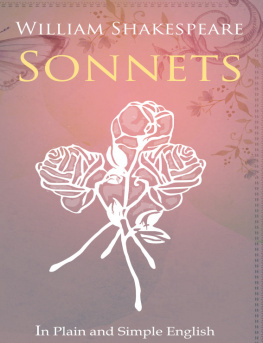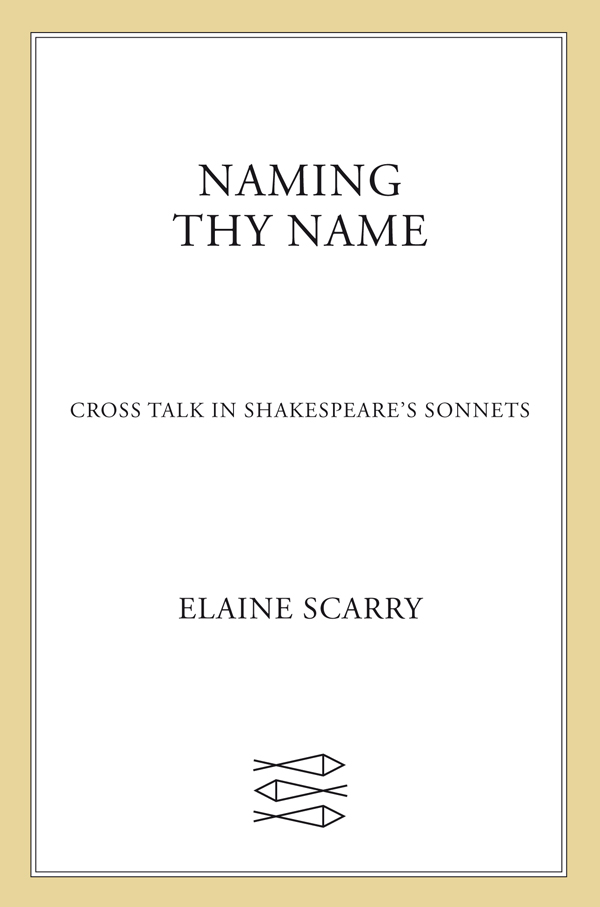Contents
Guide

The author and publisher have provided this e-book to you for your personal use only. You may not make this e-book publicly available in any way. Copyright infringement is against the law. If you believe the copy of this e-book you are reading infringes on the authors copyright, please notify the publisher at: us.macmillanusa.com/piracy.
for
Philip Fisher
Unable to find a shadow of you,
a shadow of me,
I wandered lost, without a guide.
Beneath a double night with double light,
you pressed down on me,
wayward love seizing me from exile.
Struck by twin thunderbolts, our eyes hurl light,
they tremble and flash like a star-filled night,
they ignite a torchlike the Northern Star
that sailors seek when the storm is through
so that I might find traces of me,
traces of you.
This is a youthful and ardent poem. The author does not seem to have thought it worth preserving: it does not appear in his published books, or in his manuscripts; it survives only because it was published in a foreign language in a foreign land by someone who saw and admired his young writings.
But there is a reason to stop and listen to it. What we hear in this passage is a voice we have not heard before. It is the voice of Shakespeares beautiful young man. We have heard many descriptions of him: Shakespeare speaks to or about him in more than 126 sonnets. But we have not heard from himor, hearing from him, did not recognize his intimate bond with the playwright. In this poem, as in many others, he tells not just what it is like to be loved by Shakespeare but what it is like to be made love to by him. The claim of being struck by lightning recurs in seven of his poems. While the jagged lines of lightning are in part a salute to the zigzagging javelin of Shakespeares surname, there can be little doubt that the poet, painfully in love, was struck by this friendship as by a radiant blow: harrowing and miraculous.
Having so often heard Shakespeares account of their love, we might wish to ignore his voice for a brief time and submerge ourselves instead in the voice of the beloved friend. Though he often speaks in great distress, he also defends himself brilliantly against Shakespeares complaints. In his most intimate poems, he conceives of himself and his lover as twins, and speaks with the tender confidence we associate with Romeo and Juliet.
I send, Light, this narcissus bloom of earliest spring
so that our songs will be yoked together inside the blossom.
To restore the balance, sing back to me with moistened lips.
In return for my flower, send your flower to me.
While it may be hard to turn away from this lyric voice, we must open this story by listening for a time to Shakespeare. By doing so we will come to see what, with the help of patience and suspension of disbelief, may eventually stand forth with simple clarity: the beautiful young man is the poet, international diplomat, and brave defender of religious tolerance Henry Constableor, as he was often called by contemporaries, sweet Henry Constable.
Sweet Henry Constable? Ben Jonson spoke of Henry Constables Ambrosiack Muse; an anonymous poet called him Englands sweete nightingale; the sixteenth-century fin de sicle play Return from Parnassus reported, Sweete Constable doth take the wondring ear / And layes it up in willing prisonment. In all three instances, what motivates the saluteand sense of belovednessare Constables poems, which were circulating by the early 1590s and in print by 1592: Diana was one of the two or three earliest sonnet sequences in England; it was widely read, admired, and emulated, and was reprinted with additional poems in 1594. But the sense that his voice was like nectar to other people cannot be attributed to the poems alone, however laden they are with the golden gifts of ingenuity and friendship.
In his person, too, Henry Constable had unusual allure. We know this because of a remarkable fact: it was reported of three different monarchsEnglands Queen Elizabeth, Frances Henry IV, and Scotlands James VIthat Henry Constable was a favorite of the sovereign. That he should be held in high esteem by one is interesting; by two is startling; by three, astonishing. What, more precisely, is astonishing is not just that he was liked but that, in a world where scores of people must have been vying for royal attention, his being liked was so conspicuous to onlookers that three different letter-writers in three different countries and three different years were incited to include the observation in their correspondence. Shakespeare again and again tells us his friend is singular; but this does not mean anyone else in the world need arrive at the same judgment. For the record, however, it appears that many people did.
It might seem, from the little that has so far been said here, that Henry Constablethe darling of poets, playwrights, kings, and queenslived in a buoyant world of privilege and wealth. If one had to hold a single picture in mind to represent the full arc of his life, however, a more representative picture might be of an austere religious pilgrim covering thousands of miles on foot and on horseback, living in isolation, dedicated to his faith, which, after 1591, was Catholicism. Or perhaps a picture of him in a prison cell: Tower or Fleet Prison, one may take ones pick since he spent months in the first and years in the second. His Spiritual Sonnets to the Trinity and to an array of female saints, written in the 1590s but unpublished in his lifetime, have struck some readers as the most powerful of his poems. In them one hears an intensity of aspiration, suffering, and devotion that is matched only by his poems to a male beloved, the poems that we will attend to here.
In the initial years of their relationship, the two men were not yet the accomplished and worldly people they would shortly become. They inhabited that blissfully misty country of youth that guarantees a few brief years of privacy, off-limits to contemporaries and to later historians as well. Biographers of Shakespeare refer to the 1580s as his lost years. Constable and Shakespeare (who was his own wifes junior by eight years) were close enough in age that they perceived one another as twins and delighted in their shared youth. While Shakespeare says his friends skin is delicate and his own weathered, only in one sonnet does he designate himself older, and there he questions the reality of that very designation: How can I then be elder than thou art?
This book is written in the belief that what it describes is true. But its author only believes it to be true; she does not know it to be true. That would require more evidence than has so far been assembled. (The reader may therefore wish to insert before more than one sentence the phrase For the time being, let us imagine that). But one dimension of what follows is certainly true: Shakespeare did not live in a world where he was the only person speaking; the people in his world, above all those he loved, certainly had voices. At the very least, what follows provides the texture of conversation, of call and recall, of words sent out and words returning that would have constituted the fabric of his life.
If the evidence about Henry Constables place in Shakespeares heart is incomplete, it is neverthelessas we will seeelaborate. Shakespeares devotion to his friend is present in the micro texture of the sonnets, in their overarching architecture, and in their deep fabric. It is with the first that we will begin, because it is here and in Henry Constables answering poems that the two lovers spell out in full one anothers names.










